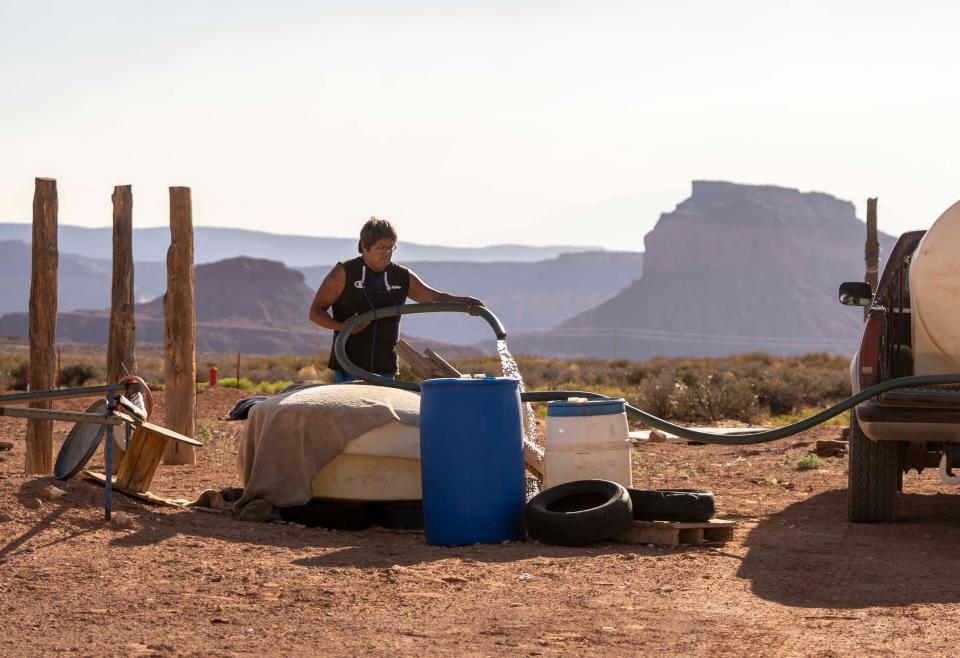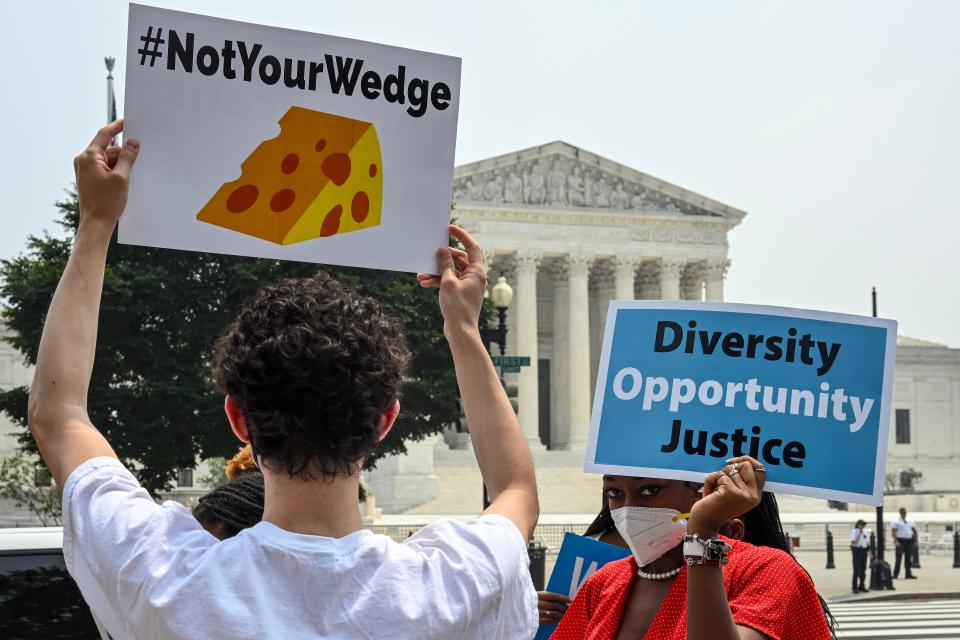Native students say Supreme Court ruling on affirmative action may limit paths to education
Tommy Rock never thought he would attend Princeton University, especially as a postdoctoral research fellow, and as he completes his time at the Ivy League institution, he believes he wouldn't have made it there if it were not for affirmative action.
“Princeton University is the last place I thought I’d end up,” said Rock, who is one of 10 recipients of Princeton’s Postdoctoral Research Associate and Presidential Postdoctoral Research Fellowship. “I learned a lot. I don’t think it would’ve been possible without affirmative action.”
One of the main elements of this fellowship is its focus on diversifying the university, but last month the U.S. Supreme Court ruled 6-3 against the use of affirmative action in college admissions. In his majority opinion, Chief Justice John Roberts wrote that admissions programs used by the University of North Carolina and Harvard College violate the Constitution’s equal protection clause, which bars racial discrimination by government entities.
Whether the decision in Students for Fair Admissions, Inc. vs. President and Fellows of Harvard College could impact prestigious programs such as the one Rock spent the last two years in isn’t clear. Rock, who is a member of the Navajo Nation and originally from Monument Valley, Utah, was the only Native American recipient of the fellowship in his cohort.
After the Supreme Court ruling, the Princeton University President Christopher L. Eisgruber sent a letter expressing his disappointment.
“Diversity benefits learning and scholarship by broadening the range of questions, perspectives, and experiences brought to bear on important topics throughout the university,” he said. “Our multicultural society requires that, in the words of Justice Sandra Day O’Connor, 'the path to leadership (must) be visibly open to talented and qualified individuals of every race and ethnicity.'”
A 2022 study by Quad Education Group reported that fewer than 1% of the school's incoming class at Princeton were Indigenous students. That year, Princeton University received 37,601 applications and accepted 1,647 students, for an acceptance rate of 4.4%.
“Princeton is predominately white,” said Rock. “There are very few Natives.”
'We do not live in a color-blind world'
Rock's road to higher education didn’t start smoothly or in what many would consider a traditional way. After dropping out of high school, then going back, he attended junior colleges not knowing exactly what he wanted to do. He even enlisted in the Marines, but bad hearing prevented him from joining. He started to work odd jobs and hang out with the wrong crowd, eventually growing tired of that scene.
“I got fed up with it,” said Rock. “I hitchhiked back home, gathered my stuff, and I started to hitchhike out of there. A friend of mine from Kayenta picked me up. Telling him what I was doing, I told him ‘I’m going to school.’”
And from that point on, Rock has been in school. He holds a Ph.D. in Earth science and environmental sustainability, and an M.A. in sustainable community from Northern Arizona University, and a B.A. in interdisciplinary studies from Arizona State University.

While at Princeton, Rock was a postdoctoral research fellow in the Department of Geosciences, where he initiated a program to expand the identification, monitoring, and communication of environmental hazards related to legacy uranium mining and ongoing oil and gas exploration in the Navajo Nation.
“I was really surprised I got in,” said Rock about his fellowship. “It's very competitive.”
The American Indian College Fund said it was disheartened by the Supreme Court ruling and concerned because it would affect the equitable access to affordable higher education for American Indian and Alaska Natives and other diverse student groups.
American Indian College Fund is a nonprofit organization that helps Native American students, supporting them with scholarships and funding toward higher education, because, despite common beliefs, Indigenous students don't all receive free higher education.
Rep. Eli Crane: Arizona Republican steps in it with his 'colored people' gaffe
Responding to a majority opinion that claimed affirmative action policies are unconstitutional because they “unavoidably employ race in a negative manner” and use “racial stereotyping,” the nonprofit argued that the “color-blind society” the court tried to perceive in its ruling is farfetched.
“With regard to the facts of our lives lived in the real world that show us that, in fact, we do not live in a color-blind world: Our histories and cultures are still being removed from curricula across the country,” the group said. “Students continue to face prohibitions from wearing regalia at graduation ceremonies. Native students are frequently excluded from accessing campus resources and rarely see themselves represented on college campuses.”
Educational success and tribal sovereignty are 'intertwined'
Wendy Shelly Greyeyes., a member of the Navajo Nation, an associate professor of Native American studies at the University of New Mexico and author of "A History of Navajo Nation Education: Disentangling Our Sovereign Body," said the decision is frightening for Native people because it means Indigenous students' opportunities to access education have shrunk.
“Highly competitive schools will not be permitted to factor race into their decision making, which reduces our access to these schools,” said Greyeyes. “Obtaining a college education is sometimes the only pathway for economic survival. It is disappointing that the majority of supreme court justices don’t recognize that race is still a reality for our country.”
Opinion: Affirmative action didn't give me a handout. It gave me an opportunity
Indigenous young people carry the burden of generational poverty and low educational outcomes in their families, she said. To succeed in American society, a college education is necessary to be competitive in the job market.
“Our sovereignty as the Navajo people is intertwined into the success of our Navajo students,” said Greyeyes. “Because if our students aren’t going to college or in a career, they become dependent on our tribal government’s resources.”
It’s a “vicious cycle,” she said, and advocates must find a way to change the Supreme Court justices' effort to play politics and insert their racist ideology into our American democracy.
“If this is a country that is established on equal rights and equity then that should be the guiding principles for higher education,” said LeManuel “Lee” Bitsoi, a member of the Navajo Nation who is currently the vice president of diversity, equity and inclusion at Brandeis University in Waltham, Mass.
“Bringing it all to the present day, in terms of affirmative action, because of this historical and systemic racism and discrimination, the playing fields are never going to be leveled until every community has equal access,” he said. “When we have that, then we can talk about eliminating affirmative action.”
He said colleges and universities should do away with the elitist legacy and donor admission policies and the preferential treatment of athletes in admissions.

How higher education can help preserve traditions
Bitsoi earned a bachelor of science degree from the University of New Mexico, holds a master of education degree from Harvard University and a doctorate degree in higher education administration from the University of Pennsylvania.
“I'm the first generation college-goer and graduate so education was instilled in me at a very young age by my mother,” said Bitsoi. “She is a boarding school survivor, even though she had not so good of an experience with boarding school she understood education as a way to become more socially and economically mobile.”
In 2022, Harvard University accepted only 2,320 applicants out of 57,786, an acceptance rate of 4%, the lowest in the Ivy League. According to the Quad Education Group study, about 1.1% of its incoming students were Native American students.
Bitsoi said he recommends that higher education in the country take a look at American Indian and Alaskan Native people through “the tribal sovereignty lens.”
“When they are reaching out and recruiting American Indian and Alaskan Native people it should be done under the framework of tribal sovereignty,” said Bitsoi. “Because as Indigenous people, American Indian and Alaskan Native people, we have tribal sovereignty, so we are dual citizens.”
American Indians and Alaskan Natives have enrolled tribal numbers as well as social security numbers, he said, so higher education should consider recruitment based on that dual citizenship.
“As Indigenous people we don't only have racial identity, we also have a political identity,” said Bitsoi. “That’s all rooted back to tribal sovereignty, treaties and agreements that were drawn up that guarantee education, natural resources, health care, social services etc.”
Peoria schools: Board rejects free computer science program that has commitment to diversity
Bitsoi mused about whether he believed he benefited from affirmative action, and said he probably did in some ways, but he was already academically proficient.
“At the graduate level, I believe I was a competitive candidate because I had the academic ability and GPA, I did have the GRE scores, letter of recommendations,” said Bitosi. “It’s a whole process of where you submit a personal statement and that allowed me to share who I was. My academic ability was already demonstrated, and I also brought another diverse perspective because there were very few American Indian and Alaska Native students at Harvard.”
Greyeyes and Rock both believe the ruling against affirmative action is a step back.
Although a Western education is of value for Native students, so is the learning and the retention of their tribe's culture and language, said Bitsoi.
"The future of Native America is the retention and renaissance of Native languages and culture because that's what makes us different from everyone else," said Bitsoi. "If there comes a time we aren't speaking our languages, we are going to lose our culture, and if that comes to pass, we will be the same as everybody else. If that happens, they will say we are like everybody else and we don't need tribal sovereignty, or land bases, or reservations, all these federal statute and statuses will be taken away and that's why we need to maintain our language and culture."
Arlyssa Becenti covers Indigenous affairs for The Arizona Republic and azcentral. Send ideas and tips to arlyssa.becenti@arizonarepublic.com.
Support local journalism. Subscribe to azcentral.com today.
This article originally appeared on Arizona Republic: Native students say affirmative action ruling could block admissions

